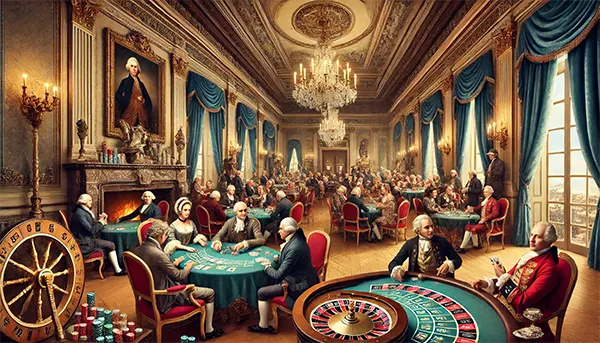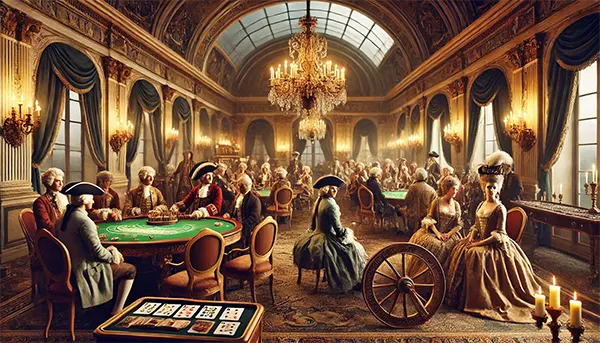The Impact of the French Revolution on Gambling and Casinos

The French Revolution, which took place at the end of the 18th century, had a profound impact on the political, economic, and social landscape of Europe. One of the lesser-explored areas influenced by this period was gambling and the development of casinos. For centuries, gambling was not only a pastime for the wealthy and noble but also part of cultural traditions, and the French Revolution was no exception. However, the social, economic, and political changes brought about by this period significantly altered the relationship with gambling, fostering its development and the formation of new models of the gambling business. This article will explore the influence of the French Revolution on gambling, the formation of modern casinos, and the way it changed the social and economic landscapes of gambling activities.
The Rise of Modern Gambling Businesses
The French Revolution, which brought significant changes in all areas of life, also affected the tradition of gambling. Up until that time, gambling had been an important aspect of French society, especially among the aristocracy. However, with the onset of the revolution, attitudes toward these activities began to change. The absence of central authority and the spread of new democratic ideas led to a certain liberalization of gambling practices, which in turn influenced the development of the first official casinos. This period marked a key turning point for the gambling industry, as casinos started becoming regulated and their presence began to expand across Europe.
Following the revolution, the public began to view gambling not only as a pastime for the rich but also as an accessible entertainment for the middle class. The social dynamics around gambling evolved as the old aristocratic structures gave way to a more inclusive society. The idea of gambling as a leisure activity for all social classes became popular, and this shift changed the entire gambling industry. The middle class embraced gambling as a form of socialization, leading to the rapid growth of casinos across France and, eventually, the rest of Europe.
As the revolution brought about significant political changes, it also prompted the rethinking of various cultural practices, including gambling. The rise of the middle class and the liberalization of society allowed gambling to emerge as a social activity that was no longer confined to the elite. The opening of new casinos and the increasing interest from diverse social groups helped lay the foundation for the modern gambling business. This was a time of transformation for the gambling industry, where traditional aristocratic gambling halls gave way to larger, more accessible venues for the general public.
The Impact of Political Changes
The political changes following the French Revolution significantly influenced the regulation of gambling. The government that emerged after the revolution began regulating gambling activities, allowing the establishment of casinos in certain regions of France. This marked one of the first steps toward the legalization of gambling, signaling the beginning of a new phase in the development of the industry. By the end of the revolution, legal frameworks were being put in place to ensure that casinos operated in a more structured and regulated manner.
One of the most important political developments during this time was the creation of laws aimed at preventing fraud and ensuring fairness in gambling. These laws were designed to protect both casino owners and players. With the increasing popularity of gambling, it became essential to set clear standards for casino operations, including transparency in gaming rules and financial transactions. This shift towards formalizing the gambling industry was essential for its long-term growth.
As the revolution led to the establishment of a new political order, it also provided the foundation for the establishment of official casinos. The creation of a legal and regulated gambling industry marked the beginning of modern casino establishments. Political stability allowed for a system in which casinos could thrive under new rules and guidelines. The political revolution thus had a far-reaching impact on the structure of gambling businesses, transitioning from unregulated betting to more organized and secure casino operations.
Changes in Social Relations and Gambling
The social changes that took place after the French Revolution inevitably impacted attitudes towards gambling. The absence of the nobility, which had traditionally been the primary consumer of gambling services, led to casinos becoming more accessible to wider segments of society. This resulted in a change in the audience visiting casinos, broadening the gambling business beyond the aristocracy. The rise of a middle class, increasingly interested in gambling, acted as a catalyst for the development of new forms of casinos that catered to other social groups. Gambling halls began opening in major cities across France, quickly spreading to other parts of Europe, contributing to the rapid growth of the gambling industry.
The rise of the middle class and the spread of democratic ideals also led to a greater demand for leisure activities, including gambling. As more people became interested in visiting casinos, gambling evolved from a high-society pastime to a widespread form of entertainment. This social change had a profound impact on the gambling industry, leading to the development of new types of casinos and games. The public’s growing interest in gambling created new opportunities for entrepreneurs to invest in casino businesses.
Social changes during this period also created new opportunities for people from different walks of life to engage in gambling. With the decline of aristocratic power, traditional social structures were disrupted, and casinos were no longer seen as exclusive venues for the elite. This democratization of gambling made it more accessible to the general public, contributing to the growth of the casino industry across Europe. The social shift fostered an environment where gambling could flourish outside of its historical associations with the upper class.
Economic Consequences for the Gambling Industry
The economic changes following the revolution also had a positive impact on the development of casinos. Specifically, the growing demand for gambling among new social groups led to the emergence of new forms of entertainment, such as blackjack and roulette. These games became increasingly popular among the working and middle classes, ensuring the continued growth of the gambling business. The surge in demand for gambling helped expand the casino industry, which began to include a broader range of games and offerings to cater to the diverse tastes of the public.
This economic expansion allowed casinos to operate on a larger scale and reach more customers. With the growing popularity of casinos, new venues opened in various parts of France and other European countries. The economic benefits of gambling became increasingly apparent, as it generated significant revenue for governments and casino owners alike. This economic boon was further fueled by the growing accessibility of casinos to a broader audience.
Additionally, the liberalization of the economy following the revolution helped foster a more competitive gambling environment. As casinos multiplied and diversified, competition between them increased, leading to the development of better services, improved gaming experiences, and more attractive offers for customers. This period marked the beginning of the commercialization of the gambling industry, which laid the groundwork for the modern global casino business we recognize today.

Establishing New Standards in the Gambling Business
An important consequence of the French Revolution’s impact on gambling was the establishment of new standards for the gambling business. The government began actively regulating the operations of casinos, creating rules to ensure fairness in games and protect against fraud. This was the first step toward the establishment of the modern gambling industry that we know today. The formalization of gambling practices provided structure and stability to the industry, helping it grow into a legitimate and respected business.
One such step was the introduction of rules for organizing games like roulette and blackjack, making the gambling process more transparent and fair for all participants. With the creation of these standards, players could have greater confidence in the fairness of the games, knowing that they were being governed by set rules and regulations. This marked a major step forward for the industry, as it moved from informal betting to fully regulated and transparent operations.
Additionally, the establishment of regulations for casino operations allowed for the creation of international standards that casinos could adopt. This helped ensure the consistency of operations across different countries and laid the foundation for the globalization of the gambling industry. The legal and regulatory frameworks established during the post-revolution period provided the foundation for the casino industry to expand and thrive across Europe and beyond, setting the stage for the international casino networks that exist today.
The Development of International Casinos
Despite the complicated political context of the time, the French Revolution served as a catalyst for the development of international casinos. Many French citizens, both men and women, emigrated to other countries, which allowed French gambling traditions to spread across the world. This led to the creation of international casino networks that began hosting gambling events for players from different countries, ultimately contributing to the globalization of the gambling business. The development of the casino industry in various nations played a crucial role in shaping the global culture of gambling, which later became a worldwide phenomenon.
The expansion of casinos outside of France led to the spread of French gaming traditions and the development of a more global gambling culture. As casinos began to open in other parts of Europe and beyond, gambling became a common activity enjoyed by people from different cultures and backgrounds. This internationalization of the casino industry played a key role in making gambling a global phenomenon.
Ultimately, the global reach of casinos helped shape the modern gambling industry as we know it. The spread of gambling traditions from France to other countries helped create the international network of casinos, which today operates on a global scale. The French Revolution, with its far-reaching political, economic, and social changes, played a pivotal role in transforming the gambling business from a local pastime to a global industry.
